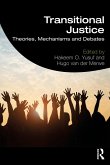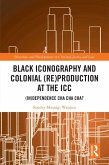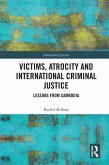Yvonne McdermottCritical Perspectives
The Ashgate Research Companion to International Criminal Law (eBook, PDF)
Critical Perspectives
Redaktion: Schabas, William
49,95 €
49,95 €
inkl. MwSt.
Sofort per Download lieferbar

25 °P sammeln
49,95 €
Als Download kaufen

49,95 €
inkl. MwSt.
Sofort per Download lieferbar

25 °P sammeln
Jetzt verschenken
Alle Infos zum eBook verschenken
49,95 €
inkl. MwSt.
Sofort per Download lieferbar
Alle Infos zum eBook verschenken

25 °P sammeln
Yvonne McdermottCritical Perspectives
The Ashgate Research Companion to International Criminal Law (eBook, PDF)
Critical Perspectives
Redaktion: Schabas, William
- Format: PDF
- Merkliste
- Auf die Merkliste
- Bewerten Bewerten
- Teilen
- Produkt teilen
- Produkterinnerung
- Produkterinnerung

Bitte loggen Sie sich zunächst in Ihr Kundenkonto ein oder registrieren Sie sich bei
bücher.de, um das eBook-Abo tolino select nutzen zu können.
Hier können Sie sich einloggen
Hier können Sie sich einloggen
Sie sind bereits eingeloggt. Klicken Sie auf 2. tolino select Abo, um fortzufahren.

Bitte loggen Sie sich zunächst in Ihr Kundenkonto ein oder registrieren Sie sich bei bücher.de, um das eBook-Abo tolino select nutzen zu können.
This unique Research Companion takes a critical approach to a wide variety of theoretical, practical, legal and policy issues surrounding and underpinning the operation of international criminal law as applied by international criminal tribunals. The authors raise issues which are likely to provide the most significant challenges and most promising opportunities for the continuing development of this body of law.
- Geräte: PC
- mit Kopierschutz
- eBook Hilfe
- Größe: 3.76MB
Andere Kunden interessierten sich auch für
![The Criminal Law of Genocide (eBook, PDF) The Criminal Law of Genocide (eBook, PDF)]() Paul BehrensThe Criminal Law of Genocide (eBook, PDF)53,95 €
Paul BehrensThe Criminal Law of Genocide (eBook, PDF)53,95 €![Futures of International Criminal Justice (eBook, PDF) Futures of International Criminal Justice (eBook, PDF)]() Futures of International Criminal Justice (eBook, PDF)44,95 €
Futures of International Criminal Justice (eBook, PDF)44,95 €![The Criminal Law of Genocide (eBook, ePUB) The Criminal Law of Genocide (eBook, ePUB)]() Paul BehrensThe Criminal Law of Genocide (eBook, ePUB)53,95 €
Paul BehrensThe Criminal Law of Genocide (eBook, ePUB)53,95 €![Transitional Justice (eBook, PDF) Transitional Justice (eBook, PDF)]() Transitional Justice (eBook, PDF)35,95 €
Transitional Justice (eBook, PDF)35,95 €![Futures of International Criminal Justice (eBook, ePUB) Futures of International Criminal Justice (eBook, ePUB)]() Futures of International Criminal Justice (eBook, ePUB)44,95 €
Futures of International Criminal Justice (eBook, ePUB)44,95 €![Black Iconography and Colonial (re)production at the ICC (eBook, PDF) Black Iconography and Colonial (re)production at the ICC (eBook, PDF)]() Stanley Mwangi WanjiruBlack Iconography and Colonial (re)production at the ICC (eBook, PDF)42,95 €
Stanley Mwangi WanjiruBlack Iconography and Colonial (re)production at the ICC (eBook, PDF)42,95 €![Victims, Atrocity and International Criminal Justice (eBook, PDF) Victims, Atrocity and International Criminal Justice (eBook, PDF)]() Rachel KilleanVictims, Atrocity and International Criminal Justice (eBook, PDF)44,95 €
Rachel KilleanVictims, Atrocity and International Criminal Justice (eBook, PDF)44,95 €-
-
-
This unique Research Companion takes a critical approach to a wide variety of theoretical, practical, legal and policy issues surrounding and underpinning the operation of international criminal law as applied by international criminal tribunals. The authors raise issues which are likely to provide the most significant challenges and most promising opportunities for the continuing development of this body of law.
Dieser Download kann aus rechtlichen Gründen nur mit Rechnungsadresse in A, B, BG, CY, CZ, D, DK, EW, E, FIN, F, GR, HR, H, IRL, I, LT, L, LR, M, NL, PL, P, R, S, SLO, SK ausgeliefert werden.
Produktdetails
- Produktdetails
- Verlag: Taylor & Francis eBooks
- Seitenzahl: 600
- Erscheinungstermin: 23. März 2016
- Englisch
- ISBN-13: 9781317043157
- Artikelnr.: 44870963
- Verlag: Taylor & Francis eBooks
- Seitenzahl: 600
- Erscheinungstermin: 23. März 2016
- Englisch
- ISBN-13: 9781317043157
- Artikelnr.: 44870963
- Herstellerkennzeichnung Die Herstellerinformationen sind derzeit nicht verfügbar.
William Schabas is Professor of International Law at Middlesex University, UK, Yvonne McDermott is Lecturer in Law at Bangor University, UK and Niamh Hayes is Head of Office at the Institute for International Criminal Investigations, The Hague, the Netherlands.
Contents: Preface; Introduction, Niamh Hayes, Yvonne McDermott and William
A. Schabas; Part I International Crimes and Modes of Liability: Sisyphus
wept: prosecuting sexual violence at the International Criminal Court,
Niamh Hayes; Creating a framework for the prosecution of environmental
crimes in international criminal law, Tara Smith; Alleged aggression in
Utopia: a international criminal law examination question for 2020, Roger
S. Clark; The Special Tribunal for Lebanon and terrorism as an
international crime: reflections on the judicial function, Ben Saul; Damned
if you don't: liability for omissions in international criminal law,
Christopher Gosnell; Joint criminal enterprise liability: result orientated
justice, Wayne Jordash. Part II The International Criminal Process: Rights
in reverse: a critical analysis of fair trial rights under international
criminal law, Yvonne McDermott; Victims' participation at the International
Criminal Court: benefit or burden?, Lorraine Smith-van Lin; A shifting
scale of power: who is in charge of the charges at the International
Criminal Court?, Dov Jacobs; Distinguishing creativity from activism:
international criminal law and the 'legitimacy' of judicial development of
the law, Joseph Powderly; Equality of arms in international criminal law:
continuing challenges, Charles Chernor Jalloh and Amy DiBella; Protecting
the rights of the accused in international criminal proceedings: lip
service or affirmative action?, Colleen Rohan; Reconciliation and
sentencing in the practice of the ad hoc tribunals, Silvia D'Ascoli. Part
III Complementarity and Sentencing: a Discussion: A sentence-based theory
of complementarity, Kevin Jon Heller; 'Sentencing horror' or 'sentencing
heuristic'? A reply to Hellers's 'sentence-based' theory of
complementarity, Carsten Stahn; Three theories of complementarity: charge,
sentence or process? A comment on Kevin Heller's sentence-based theory of
complementarity, Darryl Robinson.
A. Schabas; Part I International Crimes and Modes of Liability: Sisyphus
wept: prosecuting sexual violence at the International Criminal Court,
Niamh Hayes; Creating a framework for the prosecution of environmental
crimes in international criminal law, Tara Smith; Alleged aggression in
Utopia: a international criminal law examination question for 2020, Roger
S. Clark; The Special Tribunal for Lebanon and terrorism as an
international crime: reflections on the judicial function, Ben Saul; Damned
if you don't: liability for omissions in international criminal law,
Christopher Gosnell; Joint criminal enterprise liability: result orientated
justice, Wayne Jordash. Part II The International Criminal Process: Rights
in reverse: a critical analysis of fair trial rights under international
criminal law, Yvonne McDermott; Victims' participation at the International
Criminal Court: benefit or burden?, Lorraine Smith-van Lin; A shifting
scale of power: who is in charge of the charges at the International
Criminal Court?, Dov Jacobs; Distinguishing creativity from activism:
international criminal law and the 'legitimacy' of judicial development of
the law, Joseph Powderly; Equality of arms in international criminal law:
continuing challenges, Charles Chernor Jalloh and Amy DiBella; Protecting
the rights of the accused in international criminal proceedings: lip
service or affirmative action?, Colleen Rohan; Reconciliation and
sentencing in the practice of the ad hoc tribunals, Silvia D'Ascoli. Part
III Complementarity and Sentencing: a Discussion: A sentence-based theory
of complementarity, Kevin Jon Heller; 'Sentencing horror' or 'sentencing
heuristic'? A reply to Hellers's 'sentence-based' theory of
complementarity, Carsten Stahn; Three theories of complementarity: charge,
sentence or process? A comment on Kevin Heller's sentence-based theory of
complementarity, Darryl Robinson.
Contents: Preface; Introduction, Niamh Hayes, Yvonne McDermott and William
A. Schabas; Part I International Crimes and Modes of Liability: Sisyphus
wept: prosecuting sexual violence at the International Criminal Court,
Niamh Hayes; Creating a framework for the prosecution of environmental
crimes in international criminal law, Tara Smith; Alleged aggression in
Utopia: a international criminal law examination question for 2020, Roger
S. Clark; The Special Tribunal for Lebanon and terrorism as an
international crime: reflections on the judicial function, Ben Saul; Damned
if you don't: liability for omissions in international criminal law,
Christopher Gosnell; Joint criminal enterprise liability: result orientated
justice, Wayne Jordash. Part II The International Criminal Process: Rights
in reverse: a critical analysis of fair trial rights under international
criminal law, Yvonne McDermott; Victims' participation at the International
Criminal Court: benefit or burden?, Lorraine Smith-van Lin; A shifting
scale of power: who is in charge of the charges at the International
Criminal Court?, Dov Jacobs; Distinguishing creativity from activism:
international criminal law and the 'legitimacy' of judicial development of
the law, Joseph Powderly; Equality of arms in international criminal law:
continuing challenges, Charles Chernor Jalloh and Amy DiBella; Protecting
the rights of the accused in international criminal proceedings: lip
service or affirmative action?, Colleen Rohan; Reconciliation and
sentencing in the practice of the ad hoc tribunals, Silvia D'Ascoli. Part
III Complementarity and Sentencing: a Discussion: A sentence-based theory
of complementarity, Kevin Jon Heller; 'Sentencing horror' or 'sentencing
heuristic'? A reply to Hellers's 'sentence-based' theory of
complementarity, Carsten Stahn; Three theories of complementarity: charge,
sentence or process? A comment on Kevin Heller's sentence-based theory of
complementarity, Darryl Robinson.
A. Schabas; Part I International Crimes and Modes of Liability: Sisyphus
wept: prosecuting sexual violence at the International Criminal Court,
Niamh Hayes; Creating a framework for the prosecution of environmental
crimes in international criminal law, Tara Smith; Alleged aggression in
Utopia: a international criminal law examination question for 2020, Roger
S. Clark; The Special Tribunal for Lebanon and terrorism as an
international crime: reflections on the judicial function, Ben Saul; Damned
if you don't: liability for omissions in international criminal law,
Christopher Gosnell; Joint criminal enterprise liability: result orientated
justice, Wayne Jordash. Part II The International Criminal Process: Rights
in reverse: a critical analysis of fair trial rights under international
criminal law, Yvonne McDermott; Victims' participation at the International
Criminal Court: benefit or burden?, Lorraine Smith-van Lin; A shifting
scale of power: who is in charge of the charges at the International
Criminal Court?, Dov Jacobs; Distinguishing creativity from activism:
international criminal law and the 'legitimacy' of judicial development of
the law, Joseph Powderly; Equality of arms in international criminal law:
continuing challenges, Charles Chernor Jalloh and Amy DiBella; Protecting
the rights of the accused in international criminal proceedings: lip
service or affirmative action?, Colleen Rohan; Reconciliation and
sentencing in the practice of the ad hoc tribunals, Silvia D'Ascoli. Part
III Complementarity and Sentencing: a Discussion: A sentence-based theory
of complementarity, Kevin Jon Heller; 'Sentencing horror' or 'sentencing
heuristic'? A reply to Hellers's 'sentence-based' theory of
complementarity, Carsten Stahn; Three theories of complementarity: charge,
sentence or process? A comment on Kevin Heller's sentence-based theory of
complementarity, Darryl Robinson.







